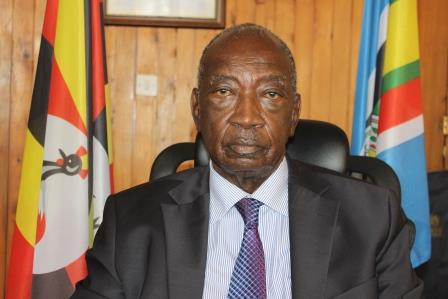The Minister for Trade, Industry and Cooperatives Francis Mwebesa has criticized the Uganda National Bureau of Standards, especially the standards police, for using excessive force when conducting operations against substandard products.
He was speaking after the inauguration of the new National Standards Council, the board responsible for overseeing the operations of the UNBS.
Mwebesa specifically warned against what he called threatening approaches when conducting operations and said that instead of responding to the call for standards, the business community becomes hostile and hideous.
He added that the teams must help the private sector to improve and comply with the standards because some of the offences they are charged with are a result of incompetence at the Uganda National Bureau of Standards.
Mwebesa also warned that confiscation of products which bear the UNBS mark could result in legal action against the bureau of standards and the government, adding that the agency should put more focus on fighting substandard products at the source, not at the shops.
He says that every item coming into the country must be inspected for standards before it crosses the border.
But UNBS says its resources are getting more stretched as the level of local manufacturing activities in the country grows. This calls for increased funding from the government if the bureau is to meet its mandate, according to the Executive Director, David Livingstone Ebiru.
The Bureau is allocated 58 billion Shillings annually to carry out its monitoring, surveillance and enforcement of standards of both locally produced goods as well as imports, but says it is usually limited in terms of resources. This includes both expenses to conduct operations and staffing.
Ebiru says that while they have consistently had to deal with inadequate funding, the situation is worsened by the recent sharp rise in the number of local manufacturers.
In 2020/21, the ED in his report detailing what they are required to do to tackle standards issues, said the UNBS needed 160 billion Shillings per year, yet they have usually been allocated less than 60 billion Shillings.
The Bureau has been implementing its plan of decentralising its activities and this involves establishing regional labs in major regional cities like Mbarara, Gulu and Mbale, to make services more accessible to the business community. But the limited funds, according to Ebiru, cannot enable them to do all this including moving around the country or reaching every importer, trader and manufacturer.
The nine-member Council will be chaired by Charles Musekura who replaced Eng. Masitula Munyaami Male.
Musekura, the new chairman of the Standards Council on his part urged the UNBS to tackle the lengthy process of product certification which he said can take as long as four months as the manufacturer waits. He says as the government encourages production at the micro level through the PARISH Development Model, unless certification is improved, industrialization will be affected.
State Minister for Industry David Bahati said poor standards of Uganda’s products was affecting the markets by killing the confidence of the consumer. He said the new council and the management must work towards building the confidence of the market.
Other members of the Council are Alfred Oyo Andima, Amina Zawedde the Ministry of Information and National Guidance Permanent Secretary, Tom Okrut, Pamela Acii, Irene Kibuuka Walusimbi, Robert Mwanje, James Kabali Kalibbala and Mohammed Omar.
Do you have a story in your community or an opinion to share with us: Email us at editorial@watchdoguganda.com













